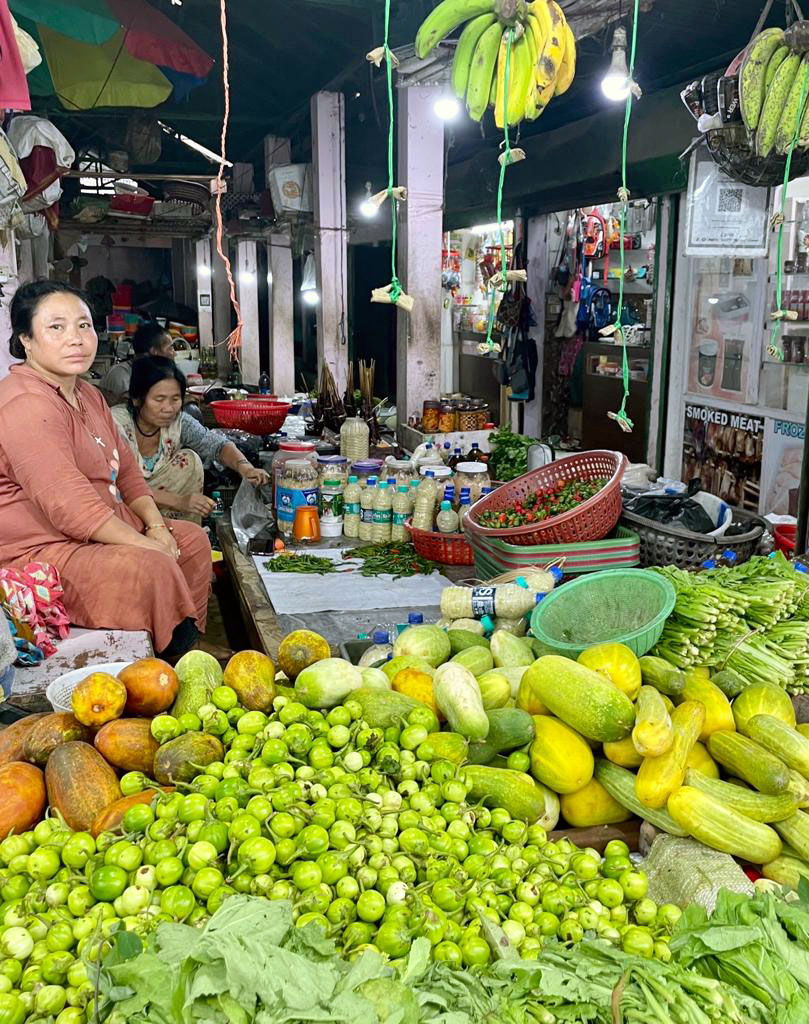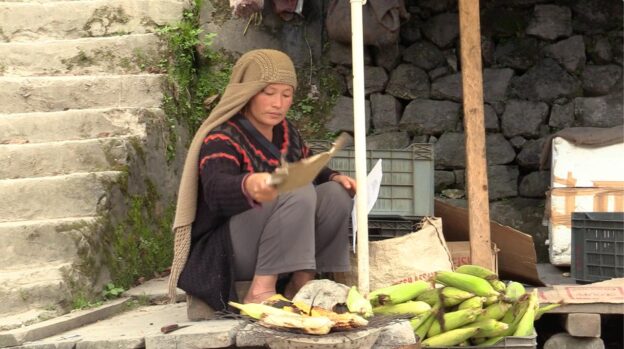Itanagar, the capital city of Arunachal Pradesh has witnessed a rapid, all encompassing change, more concentrated in the last decade. The delayed 2021 census is awaited to quantify the changes in exact numbers, but it is nevertheless, concretely visible. The socio-economic process of urbanisation has given a new face to the society and demography of the region. Urban centres are ever expanding and the mountains that were earlier dense and uninhabited, are dotted with numerous lights at night marking homes and human presence.
These processes have influenced and shaped the patterns and positions of people across class, gender and other identities. But what has remained constant is the deep cultural roots and food habits of the society. Sociologists have rightly said that, ‘taste’ is a social construct; that our taste buds do not operate independently. It is rather guided and programmed by socio cultural factors.
Foraging has always been a quintessential part of tribal life and it wasn’t very long ago that people would go for fishing, collecting herbs, fruits and other forest produces for leisure or as a means of sustenance, in and around the capital city. Today, it is an impossible and forgotten activity. Therefore, the role of women led markets that sell local produces have become all the more important. No meal a day can be prepared without at least one ingredient from these markets. But behind this visible economic interaction of demand and supply, runs numerous other pivotal processes.
Women’s role in local markets
In an attempt to bring to light these ‘behind the scene’ processes, 15 participants from the women’s markets in Itanagar were selected through ‘simple random sampling’ method. The majority of the sample had no access to formal education, while a small percentage dropped out after lower or upper primary school.
The participants spanned different age groups, with a significant portion falling in the 30-40 and 40-50 years brackets. The qualification of the children ranged from senior secondary to masters and even PhD degree. 100% of them reported spending the major chunk of their varying incomes on their children’s education, followed by household expenses and healthcare.
The zeal and dedication with which they have shown up in the market to sell produces for years and years on is telling of their handwork and resilience.
Meeting Mrs. Gichik Yaha, 60+ year old in age but young in spirit and mind was a warming experience. She had no formal education, but she is a proud mother to two sons; the elder one is a qualified government school teacher and the younger one is a fairly successful businessman.
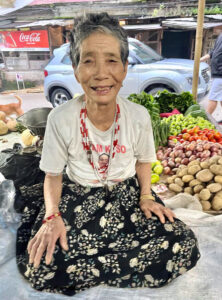
She shares that her sons and her elder daughter in-law who is also a government school teacher often ask her to retire from her business and rest at the comfort of their home. But she says she refuses to do so. When asked how her earnings are expended at this point in her life since both of her children are well settled, she replies, “I am saving up for the education o f my grandkids”. She says she hands over her earnings to her sons and they deposit the amount in the bank account opened for her grandchildren, as instructed by her.
She also shares that the market place feels like home. She likes the lively hustle-bustle and enjoys the company of fellow women around. She finds joy in sitting in her small space with her produces while catering to her customers. She has been in the market for so long that she says it has become a habitual routine for her and she would not trade any other activity to pass time over it.
The camaraderie shared between women in these markets exemplifies what Serena William says, “the success of every woman should be the inspiration to another. We should raise each other up”. Very often, they lend some amount to other women who are newcomers trying to set up their business or, when anyone amongst them face an unfortunate event. The unique thing about this particular lending is that it is interest free.
The edifice of these transactions and form of support is built on the base of trust. It is women helping women break the glass ceiling, even if the ceiling might sometimes appear to be as low as someone else’s floor.
The amount is allowed to be returned back in small installments and has a flexible deadline.
In this particular market, among the various clusters spread across Itanagar, each woman contributes a fixed amount daily. On the 10th day, the pooled money is lent to one of them, a decision made through mutual agreement. This cycle continues until every woman in the group has had a chance to borrow, after which the process begins anew. The arrangement is interest-free, affordable, and proves to be of great assistance in ensuring their businesses run smoothly.
Mrs.Yamdo and her husband had decided to shift to the state capital from their home district for better healthcare and education for their children . Her eldest son holds an LLM degree and the younger ones are pursuing their masters or continuing their school education.
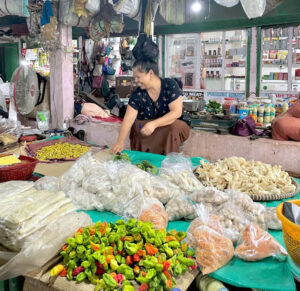
With pride and joy in her eyes, Mrs. Yamdo shares how she was able to contribute significantly to building their private residence in the capital. Her husband’s support and their cohesive teamwork have enabled them to overcome the challenges of juggling multiple roles – from being devoted parents and homemakers to successfully running their small business to secure a livelihood.
Mrs. Radhe says she started her business venture from brewing local rice beer and eventually shifted to selling local vegetables and other food items. She recalls carrying her 5 year old son on her back and prepping the ingredients for brewing beer to shifting sacks of rice carried on her back, from her home to the brewing house which was quite far. She started her small business as a means of sustenance in the start and eventually the market grew and turned conducive enough to support a profit making venture.
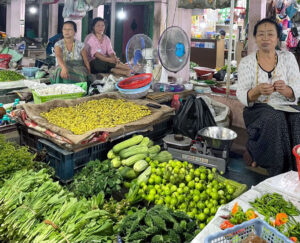
Her three sons are settled now and fending for themselves. She recollects with candour that her late husband would insist her to be at home because relatives and friends would not visit because she is mostly away at the market.They would say the house does not feel lively without her. But she choose to continue with her business to make a living and continues to do so.
While most of them were into selling local herbs, vegetable and other produces, Mrs. Gichik Yadam saw merit in the traditional ornament and jewellery business. She shares that no matter how rich people get and the number of gold items and precious stones they bought, traditional ornaments and items of cultural value could never get replaced by it. People would buy items of traditional and culture value at a price higher than that of gold; the more antique the piece, the greater would be the cost.
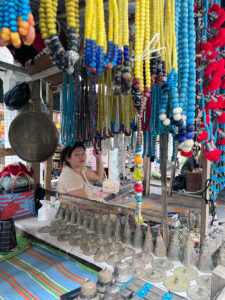
No modern jewellery is worn or used during festivals, religious ceremonies or important events like marriage, birth and death. It has continued to be used as a symbol of one’s identity across religious beliefs and tribes. The other positive side of this business she says, is the fact that these items do not have a validity date like grocery items or go stale like vegetables or fruits.
She says she had decided very early that she would earn through business since she was aware of the limitations in other spheres owning to her educational background. She says she is earning enough to afford quality education for her children and run the household as well.
Women’s contribution to the local economy
These women not only have earned a living for themselves and provided for their families and children, but also started a cycle of money flow. They buy their supplies from women in villages who cultivate or harvest these produces either from their farms or the wild and then sell them in the capital market.
They have not only exercised their agency in choosing to step out of their homes and finding ways to make a living, but enabled and empowered fellow women from the rural areas by forming an organic dependence on each other that serves both parties. By ensuring access to education for their children irrespective of their gender, they have empowered the next generation of women in the society as well.
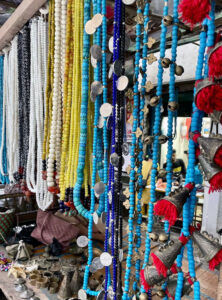
The overt as well as covert contributions these women have made in the economy and society of the state is immense and paramount. The participants who were in business for 20+ years talked about a difference in the social environment today in comparison to the days when they had started their business.
They recounted events from the past where men would often control, disallow their wives from going to the market to sell produces. They were not free to decide where to go and what to do, defying which, they were often labelled as a potential adulterer or as someone who is not a “good woman”. But today, they say, women have made their own space and compelled men to accept it as a profession as respectable as any other. The contribution they make in the household and family expenses have also positioned men to rethink and put into perspective the benefits of working as a team and treating one’s partner as an equal. Doing what Maya Angelou says, “Each time a woman stands up for herself, without knowing it possibly, without claiming it, she stands up for all women” these women have changed societal perceptions and expanded the boundaries for the next generation of women.
Pioneering the path: Government initiatives and the road ahead
They have availed benefits from government initiatives like the ‘PM Savnidhi Scheme’ and have been given a cleaner working space through the Swachh Bharat Abhiyan wherein, timely collection of waste and stale produces is ensured by the municipal authorities. There is still a lot that needs to be done, both at the societal and administrative level to further give a positive push to these women. Being a part of the informal economy, they were hit hard during the COVID lockdowns and some of them are still repaying the debt they got into to run the family at that time. The prevalence of multi-item shops have also impacted their sales.
They also voiced the need for the government to build and maintain enough market infrastructure where they could pay a reasonable rent to the government. The existing infrastructure is too small and few in number that it cannot accommodate most of them and they are compelled to rent private spaces to run their business. Many of them find it difficult to afford and are often evicted when they sell their produces by the roadsides.

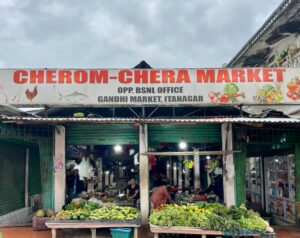 Women’s market and exotic vegetables.
Women’s market and exotic vegetables.

